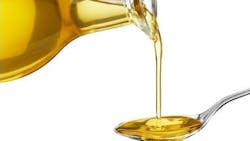The oil pulling craze: What are the true dental benefits?
I recently visited a practice that is advised by Jameson Management, and the hygienists were asking me for my opinion on oil pulling. From social media to the dental chair, this interesting holistic remedy is quite the hot topic these days when it comes to natural oral care approaches. The question is – what’s the real benefit, if any, to this trend? After researching the topic, here are the main things to know when patients ask you questions.
Oral exam: Oral oil pulling
What is it?
Oil pulling is a home remedy that involves putting about one tablespoon of oil in your mouth and swishing with it for 20 minutes. Yes, I said 20 minutes! The name comes from the mechanical action of pushing and pulling the oil between your teeth as you swish. As you do so, the microbes are pulled free from your oral cavity. You are to continue to do this until the oil turns milky white. After about 20 minutes, the solution becomes filled with bacteria and microbes. You then expectorate and rinse your mouth with water.
How dental professionals can respond to 'oil pulling' patients
Coconut oil seems to be the oil of choice because it contains lauric acid, which has antimicrobial actions. The studies using sesame oil show that bacteria in the oral cavity was reduced, however, it was less effective than chlorohexidine.
As dental professionals, should we recommend or discourage oil pulling?
We have hundreds of thousands of bacteria in our mouths, and if swishing with coconut oil for 20 minutes reduces that number, then why not? There are items on the market that are full of chemicals, such as alcohol-based mouth rinses, that our patients are using every day. If you can stand to rinse your mouth for 20 minutes with oil, no harm no foul.
The key factor that we as health-care providers need to emphasize to our patients who are curious about oil pulling is what the procedure’s place is in their overall oral care. It will be important that patients understand that this does not replace routine dental visits. This is an adjunct to oral health care. While in its own way it may support regular brushing, flossing, and dental visits, oil pulling is NOT the end-all solution to the day-to-day issues in our patients’ mouths.
More research is needed to legitimize oil pulling. You need to discuss this with your fellow team members so that you all take a team approach to answering patients’ questions. If patients have not already asked you about oil pulling, it won’t be long.
Becky Speer, RDH, is a Management and Clinical Advisor for Jameson Management, an international management, marketing, and hygiene coaching firm. Becky brings almost 20 years of dental experience to the profession, as well as hands-on experience from working with the Jameson methods in a practice. For more information on Becky and Jameson’s coaching and marketing services, visit JamesonManagement.com or call 877-369-5558.
